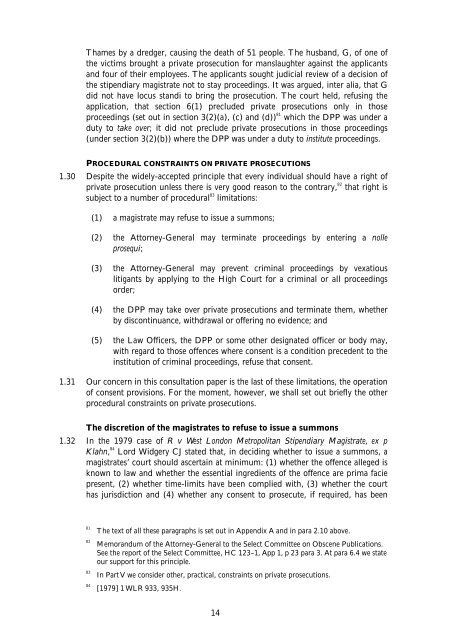cp149 Consents to Prosecution consultation - Law Commission
cp149 Consents to Prosecution consultation - Law Commission
cp149 Consents to Prosecution consultation - Law Commission
Create successful ePaper yourself
Turn your PDF publications into a flip-book with our unique Google optimized e-Paper software.
Thames by a dredger, causing the death of 51 people. The husband, G, of one of<br />
the victims brought a private prosecution for manslaughter against the applicants<br />
and four of their employees. The applicants sought judicial review of a decision of<br />
the stipendiary magistrate not <strong>to</strong> stay proceedings. It was argued, inter alia, that G<br />
did not have locus standi <strong>to</strong> bring the prosecution. The court held, refusing the<br />
application, that section 6(1) precluded private prosecutions only in those<br />
proceedings (set out in section 3(2)(a), (c) and (d)) 81<br />
which the DPP was under a<br />
duty <strong>to</strong> take over; it did not preclude private prosecutions in those proceedings<br />
(under section 3(2)(b)) where the DPP was under a duty <strong>to</strong> institute proceedings.<br />
PROCEDURAL CONSTRAINTS ON PRIVATE PROSECUTIONS<br />
1.30 Despite the widely-accepted principle that every individual should have a right of<br />
private prosecution unless there is very good reason <strong>to</strong> the contrary, 82<br />
that right is<br />
subject <strong>to</strong> a number of procedural 83<br />
limitations:<br />
(1) a magistrate may refuse <strong>to</strong> issue a summons;<br />
(2) the At<strong>to</strong>rney-General may terminate proceedings by entering a nolle<br />
prosequi;<br />
(3) the At<strong>to</strong>rney-General may prevent criminal proceedings by vexatious<br />
litigants by applying <strong>to</strong> the High Court for a criminal or all proceedings<br />
order;<br />
(4) the DPP may take over private prosecutions and terminate them, whether<br />
by discontinuance, withdrawal or offering no evidence; and<br />
(5) the <strong>Law</strong> Officers, the DPP or some other designated officer or body may,<br />
with regard <strong>to</strong> those offences where consent is a condition precedent <strong>to</strong> the<br />
institution of criminal proceedings, refuse that consent.<br />
1.31 Our concern in this <strong>consultation</strong> paper is the last of these limitations, the operation<br />
of consent provisions. For the moment, however, we shall set out briefly the other<br />
procedural constraints on private prosecutions.<br />
The discretion of the magistrates <strong>to</strong> refuse <strong>to</strong> issue a summons<br />
1.32 In the 1979 case of R v West London Metropolitan Stipendiary Magistrate, ex p<br />
Klahn, 84<br />
Lord Widgery CJ stated that, in deciding whether <strong>to</strong> issue a summons, a<br />
magistrates’ court should ascertain at minimum: (1) whether the offence alleged is<br />
known <strong>to</strong> law and whether the essential ingredients of the offence are prima facie<br />
present, (2) whether time-limits have been complied with, (3) whether the court<br />
has jurisdiction and (4) whether any consent <strong>to</strong> prosecute, if required, has been<br />
81 The text of all these paragraphs is set out in Appendix A and in para 2.10 above.<br />
82 Memorandum of the At<strong>to</strong>rney-General <strong>to</strong> the Select Committee on Obscene Publications.<br />
See the report of the Select Committee, HC 123–1, App 1, p 23 para 3. At para 6.4 we state<br />
our support for this principle.<br />
83 In Part V we consider other, practical, constraints on private prosecutions.<br />
84 [1979] 1 WLR 933, 935H.<br />
14
















